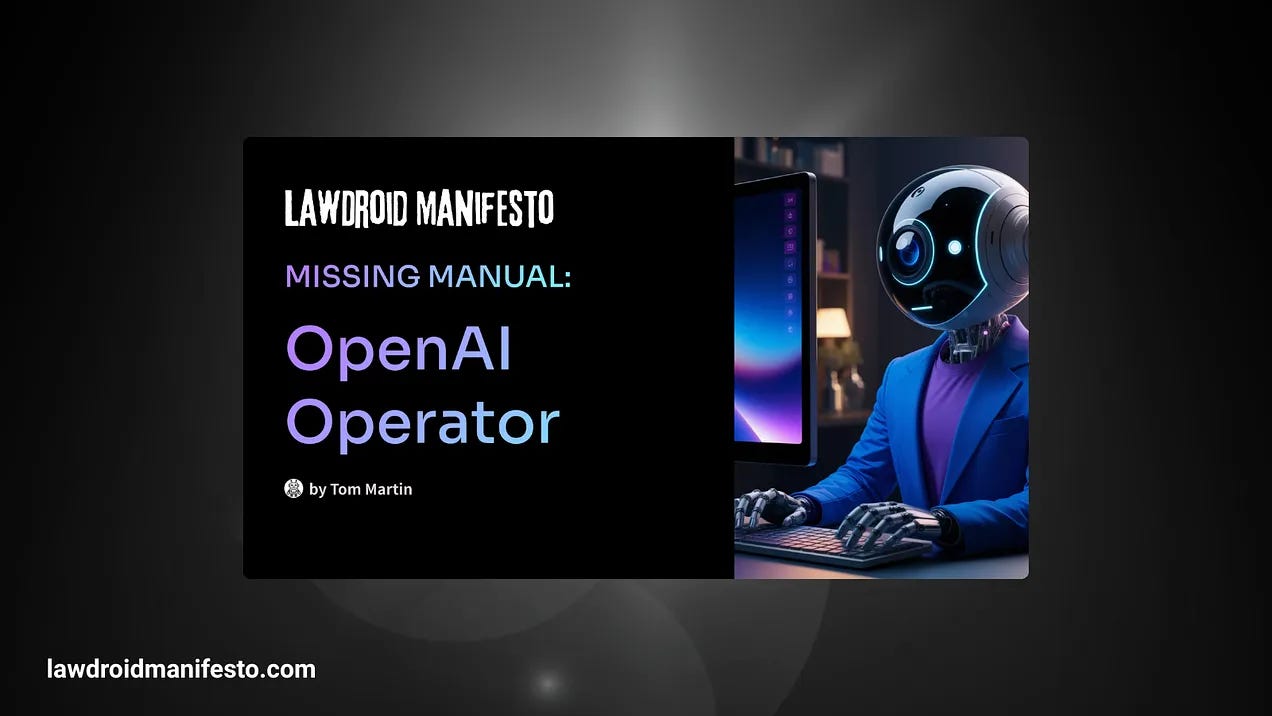Daily News: May 28, 2025
AI news that pops: daily insights, fast takes, and the future right in your inbox
Hey there friends👋! In today’s edition, you’re getting 5 🆕 news item and my take on what it all means. That’s it — delivered to your inbox, daily.
Subscribe to LawDroid Manifesto and don’t miss tomorrow’s edition:
Today's News
Here are the top 5 recent news items on artificial intelligence:
1./ Anthropic CEO warns AI could eliminate half of entry-level white-collar jobs within five years
Dario Amodei, CEO of Anthropic, urgently warns that rapidly advancing AI could wipe out up to 50% of entry-level white-collar jobs, potentially pushing unemployment to 10-20% within five years. Amodei argues the government and companies must stop sugar-coating AI’s disruptive power, as jobs in tech, finance, law, consulting, and other professional sectors become increasingly automated. Despite optimism about AI’s potential to solve major problems, Amodei stresses immediate action is required, such as public education, policy preparation, and economic redistribution, to mitigate severe job losses and inequality.
Source: https://www.axios.com/2025/05/28/ai-jobs-white-collar-unemployment-anthropic
2./ Odyssey debuts AI-powered interactive video that streams dynamic 3D worlds
Startup Odyssey, founded by self-driving veterans Oliver Cameron and Jeff Hawke, unveiled an AI model capable of streaming interactive 3D environments from video footage in real-time. The technology generates video frames every 40 milliseconds, allowing users to freely explore virtual worlds similarly to a video game. While Odyssey envisions its model transforming entertainment, education, and advertising, concerns remain about potential job disruptions for animators and game designers. The company, backed by EQT Ventures, GV, and Pixar co-founder Ed Catmull, pledges to support creators by integrating its tech into popular design tools like Unreal Engine and Adobe After Effects.
Source: https://techcrunch.com/2025/05/28/odysseys-new-ai-model-streams-3d-interactive-worlds/
3./ Why Robots Still Need Boundaries Before Roaming Free
As AI-powered robots become more common, they’re being carefully limited to avoid accidents in unpredictable environments. Autonomous vehicles like Tesla’s upcoming robotaxis and humanoid robots designed for factory work require extensive training data and real-world experience to safely navigate and interact with humans. Elon Musk, despite ambitious timelines for deploying millions of driverless cars and humanoids, acknowledges the necessity of initial geofencing, operating in strictly controlled areas. Ultimately, these AI robots need structured boundaries as they learn and adapt before they can safely roam freely.
Source: https://www.axios.com/2025/05/28/robots-ai-tesla-optimus
4./ Early Signs of AI “Model Collapse” Emerge as Search Quality Declines
AI search tools, initially praised for superior performance, are starting to exhibit signs of “model collapse,” a deterioration caused when AI models train repeatedly on their own outputs. This results in increasingly inaccurate, biased, and unreliable responses—a phenomenon driven by compounded errors, loss of rare data, and feedback loops. Recent tests by Bloomberg highlighted unexpected risks, especially in retrieval-augmented generation (RAG) systems, including privacy leaks and flawed analyses. While blending AI content with fresh human-generated data could mitigate this collapse, reliance on cheaper AI outputs continues to grow, potentially accelerating the decay and diminishing the long-term value of AI-generated information.
Source: https://www.theregister.com/2025/05/27/opinion_column_ai_model_collapse/
5./ Google Co-Founder Sergey Brin Claims Threatening AI Improves Performance
Google co-founder Sergey Brin suggested that AI models yield better responses when threatened rather than addressed politely, challenging common practices of adding “please” and “thank you” to prompts. While anecdotal, Brin’s claim highlights the complexities and unpredictability of prompting large language models (LLMs). Experts caution that systematic scientific studies have shown mixed results on whether politeness or threats improve AI outcomes, emphasizing the importance of rigorous testing over intuition in prompt engineering.
Source: https://www.theregister.com/2025/05/28/google_brin_suggests_threatening_ai/
Today's Takeaway
Today’s headlines underscore how quickly the AI conversation has shifted from promise to profound alarm. Anthropic’s stark warning about AI decimating half of entry-level white-collar jobs within five years highlights a brewing crisis that policymakers and business leaders must urgently address, or risk a wave of societal upheaval. Odyssey’s revolutionary 3D AI streaming offers dazzling new frontiers, but simultaneously amplifies fears of creative industries facing devastating disruption. Meanwhile, robots still requiring strict boundaries before safe real-world deployment reminds us that for all AI’s strides, true autonomy remains fraught with risks. More troubling is the early onset of “model collapse,” signaling that unchecked reliance on AI-generated content could rapidly degrade informational integrity online. Finally, Sergey Brin’s provocative suggestion that AI responds better when threatened rather than politely asked, though possibly facetious, chillingly highlights the unpredictability and opacity surrounding powerful models whose inner workings we still scarcely understand. Clearly, the era of naïve optimism is ending, and now is the moment for rigorous oversight, thoughtful policy, and sober realism about AI’s transformative, and disruptive, power.
Subscribe to LawDroid Manifesto
LawDroid Manifesto, your authentic source for analysis and news for your legal AI journey. Insightful articles and personal interviews of innovators at the intersection of AI and the law. Best of all, it’s free!
Subscribe today:
By the way, as a LawDroid Manifesto premium subscriber, you would get access to exclusive toolkits, like the Missing Manual: OpenAI Operator; a new toolkit released every month…
With these premium toolkits, you not only learn about the latest AI innovations and news items, but you get the playbook for how to use them to your advantage.
If you want to be at the front of the line to get first access to helpful guides like this, and have the inside track to use AI as a force multiplier in your work, upgrade to become a premium LawDroid Manifesto subscriber today!
I look forward to seeing you on the inside. ;)
Cheers,
Tom Martin
CEO and Founder, LawDroid





